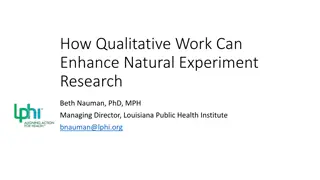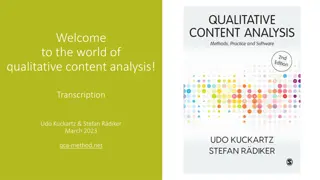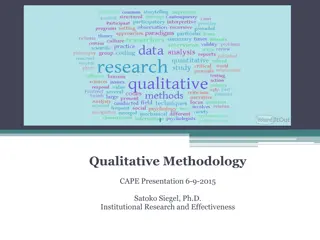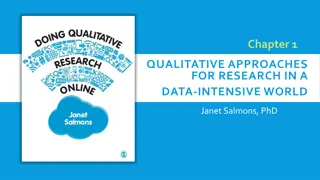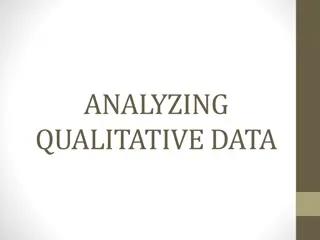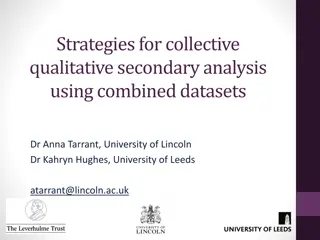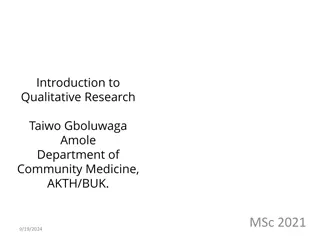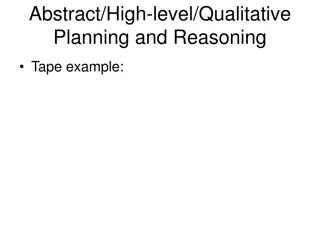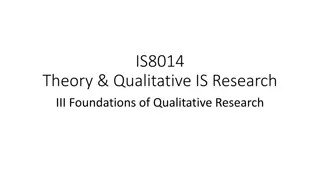Mindfulness-Based Intervention for Adolescents with Chronic Migraine: Qualitative Study
This study focuses on developing a mindfulness-based intervention for adolescents with chronic migraine, aiming to address the lack of effective treatments. Through remote interviews and qualitative analysis, stakeholders' experiences and feedback are being gathered to adapt the intervention. The re
0 views • 15 slides
Quantitative and Qualitative Research Methods
Exploring the differences between quantitative and qualitative research methods, this content delves into the importance of qualitative research, various methodologies such as focus groups and interviews, data collection, research ethics, and analysis techniques. It also covers the elements of the r
5 views • 43 slides
Qualitative Research: Foundations and Orientations
Explore the foundations of qualitative research and orientations to meaning in Big Q qualitative methods. Delve into the values, characteristics, and theoretical underpinnings of qualitative inquiry, and reflect on the significance of meaning-making in research. Consider the role of subjectivity in
1 views • 23 slides
Strategies for Successful Faculty Zoom Interviews
Helpful tips and strategies for acing faculty Zoom interviews by Antonio Faciola, Ph.D., sharing insights from personal experiences with faculty interviews. Covers preparation, background settings, academic job search tips, and details about first and final round Zoom interviews. Valuable advice on
0 views • 41 slides
The Case Study Method: In-depth Qualitative Analysis
The case study method is a popular form of qualitative analysis involving intensive observation of a social unit. It focuses on detailed analysis of a limited number of events or conditions to understand complex interrelationships. Characteristics include intensive study of a single unit, qualitativ
1 views • 8 slides
Enhancing Natural Experiment Research Through Qualitative Work
Qualitative research plays a crucial role in enhancing natural experiment studies by providing insights into the processes of exposure to interventions, identifying variables influencing exposure likelihood, and determining suitable control groups. Complementary methods within the RE-AIM framework a
1 views • 13 slides
Insights into Admission Interviews: Purpose and Preparation
Gain valuable insights into the purpose and preparation for admission interviews from the perspectives of college officials and students. Understand the significance of interviews, sample questions asked, interviewers involved, and the impact on the evaluation process. Discover why interviews are hi
0 views • 10 slides
Qualitative Data Analysis Techniques in Research
The purpose of data analysis is to organize, structure, and derive meaning from research data. Qualitative analysis involves insight, creativity, and hard work. Researchers play a crucial role as instruments for data analysis, exploring and reflecting on interview discussions. Steps include transcri
2 views • 27 slides
Using Qualitative Methods in Quality Improvement Projects
Qualitative methods offer valuable insights in quality improvement projects by capturing non-numerical information like experiences, thoughts, and perspectives. They help to understand patient and staff perspectives, challenges, and successes in QI initiatives. Utilizing techniques such as interview
2 views • 21 slides
Focus Group Discussions in Qualitative Research
Focus Group Discussion (FGD) is a qualitative research method that involves a structured discussion among a group of participants led by a skilled moderator. The aim is to gather insights, opinions, and consensus on a specific topic. FGDs facilitate interaction, generate new ideas, and offer deeper
0 views • 18 slides
Experiential vs. Critical Qualitative Research
Delve into the foundations of qualitative research with a focus on experiential and critical approaches. Explore key concepts, defining characteristics, and theoretical foundations, distinguishing between qualitative and quantitative research. Reflect on different orientations, subjectivity, and ref
0 views • 16 slides
Key Characteristics of Qualitative Research in Psychology
The lecture series delves into the values, characteristics, and theoretical foundations of qualitative research, emphasizing the differences from quantitative methods. It explores experiential and critical qualitative camps, subjectivity, reflexivity, and ontological and epistemological foundations.
4 views • 18 slides
Ensuring Trustworthiness in Qualitative Research Studies
Trustworthiness in qualitative research is essential for establishing confidence in the study outcomes. Guba's four criteria - credibility, transferability, dependability, and confirmability - provide a framework for achieving trustworthiness. Strategies such as adopting reliable research methods, u
4 views • 10 slides
NVivo: A Brief Introduction to Qualitative Data Analysis Software
Explore the world of NVivo with Dr. Will Fassbender, an Assistant Professor at Montana State University. Gain insights into qualitative data analysis, download procedures, basic functions, and more. Join this introductory session to discover how NVivo can streamline your research process and aid in
3 views • 16 slides
Interviews: Construction, Types, and Methodologies
Interviews are essential for collecting data in exploratory research. This content elaborates on the construction, types, and methodologies of interviews, including unstructured and structured approaches. Tips for minimizing bias, training interviewers, and the benefits of face-to-face interviews ar
0 views • 50 slides
Challenges in Malaria Prevention in Nigeria: A Qualitative Study
This study focuses on identifying facilitators and barriers to the uptake of Seasonal Malaria Chemoprevention (SMC) among children aged 3-59 months in selected states of Nigeria. Through key informant interviews, in-depth interviews, and focus group discussions, the research aims to analyze factors
0 views • 18 slides
Contrasting Qualitative and Quantitative Traits in Genetics
Genetic traits in organisms can be qualitative or quantitative, with qualitative traits controlled by single genes and showing distinct variations, while quantitative traits are influenced by multiple genes and environmental factors, resulting in continuous variations. Qualitative genetics focuses o
1 views • 13 slides
Qualitative Analysis of Aldehydes and Ketones in Chemistry Lab
In this Chemistry 318 lab, students will conduct qualitative analysis of aldehydes and ketones using chemical and spectroscopic methods. The lab includes classification tests, spectroscopy (IR, 1H-NMR/13C-NMR, MS), and identification of unknown compounds. Experimental procedures involve physical eva
2 views • 11 slides
Quantitative Genetics Principles in Animal Breeding
Quantitative genetics focuses on the inheritance of characteristics based on degree rather than kind, compared to qualitative genetics. It involves polygenes controlling quantitative traits, which exhibit continuous variation and can be measured using metric units. Qualitative traits, on the other h
1 views • 22 slides
Different Types of Interviews
An interview is a structured conversation where one participant asks questions and the other provides answers. This article explores various types of interviews such as news interviews, profile interviews, hard news interviews, informational interviews, personality interviews, and more. Each type se
1 views • 15 slides
Guidelines for Interview Transcription in Qualitative Content Analysis
Guidelines for transcribing interviews in Qualitative Content Analysis (QCA) include formatting rules, speaker attribution, verbatim transcription, punctuation adjustments, marking pauses and emphases, handling vocalizations and fillers, managing disruptions, and capturing non-verbal activities. Var
0 views • 7 slides
Qualitative Methodology: An Overview
This presentation delves into the realm of qualitative methodology, exploring its purpose, characteristics, approaches, data collection methods, analysis, and learning outcomes. It aims to provide a deep understanding of how qualitative research illuminates voices and experiences, distinguishes betw
1 views • 41 slides
Qualitative Approaches in a Data-Intensive World
Qualitative research involves studying perceptions, experiences, and behaviors through verbal or visual expressions. In a data-intensive world, online communication plays a crucial role in data collection. Qualitative eResearch utilizes Information and Communication Technologies (ICTs) strategically
0 views • 10 slides
Meaning and Meaning-making in Big Q Qualitative Research
Qualitative research explores different understandings of meaning and meaning-making, providing researchers with tools, techniques, and values. Big Q qualitative research focuses on the active role of words in creating meaning beyond reflecting experiences. This lecture series delves into the founda
2 views • 20 slides
Analyzing Qualitative Data: Steps and Coding Methods
Understanding qualitative data analysis involves several key steps, such as preparing the data through transcription, developing codes and categories using content analysis, revising categories based on the data, and reporting the analysis results. Content analysis helps in identifying words, themes
0 views • 32 slides
Design Philosophy for Increasing Accessibility in Qualitative Data Analysis Software
Growing interest in qualitative research methods has led to increased use of Qualitative Data Analysis Software (QDAS). However, challenges remain in making these tools accessible and easy to use, especially in educational settings. This article explores design philosophies to enhance accessibility
0 views • 16 slides
Analyzing U.S. Higher Education Success Metrics: A Qualitative Perspective
Delve into the nuances of U.S. higher education success metrics through a qualitative analysis, exploring the classification of qualitative successes in quantitative datasets and the factors influencing accurate or inaccurate classifications. The study involves individuals who attended community col
1 views • 18 slides
Perceived Risks and Risks Mitigation Practices in Informal Waste Workers: A Qualitative Study
A qualitative study conducted in Kathmandu Valley exploring the perceived risks and mitigation practices of informal waste workers. The research project, led by Sujata Sapkota, aims to address the occupational and health challenges faced by these workers. The study includes a mix of quantitative and
0 views • 22 slides
Strategies for Collective Qualitative Secondary Analysis Using Combined Datasets
Collective qualitative secondary analysis involves reusing data through a collaborative lens, embracing multiple viewpoints to gain deeper insights. The approach emphasizes the constructed nature of research data and allows for diverse interpretations and engagements. This article discusses the proc
1 views • 15 slides
Unstructured Interviews
Unstructured interviews are a form of non-directive interviews where questions are not prearranged. This method allows for flexibility and in-depth responses from participants, but it also comes with practical, ethical, and theoretical strengths and weaknesses. While unstructured interviews offer a
1 views • 6 slides
Research Methods in Public Health
Exploring the nuances of qualitative and quantitative research methods in the context of public health, this content delves into how each approach offers unique insights and perspectives. It discusses the importance of qualitative research in uncovering underlying factors influencing health, interpr
1 views • 77 slides
Qualitative Approach in Cognitive Interview Data Analysis
Understanding the importance of a qualitative approach in analyzing cognitive interview data is crucial for uncovering patterns and recurring themes. This involves delving deeper into the why behind the responses rather than just naming and classifying data. Using methods like standardised coding sc
0 views • 18 slides
Creative Problem Solving through High-level Qualitative Planning and Reasoning
Explore the world of abstract and high-level qualitative planning through examples like MacGyver's inventive solutions, opening jar tricks, and audience participation in problem-solving. Witness how qualitative reasoning can lead to innovative solutions in various scenarios.
0 views • 15 slides
Medical School Interviews Guide
Medical school interviews are crucial for universities to assess candidates beyond their academic records. This guide covers the importance of interviews, tips for the interview day, types of interviews, sample questions, and advice on handling different interview scenarios like academic, work exper
0 views • 14 slides
Qualitative Data in Counseling
Exploring the challenges and strategies in utilizing qualitative data in counseling, this discussion covers topics such as data collection, coding for meaning, and presenting qualitative evidence. The importance of qualitative data in improving counseling programs and student services is highlighted
0 views • 32 slides
Teacher Identity Development in Special Education Training
Exploring the professional development and identity (re)formation experiences of teachers specializing in Special Educational Needs (SEN), focusing on teacher identity, communities of practice, methodology, qualitative coding, and effective teaching roles. Insights from surveys, focus groups, interv
0 views • 15 slides
Conducting Stakeholder Interviews for School Quality Assessment
Stakeholder interviews are a crucial part of the school quality assessment process. The CSSI team conducts interviews with various stakeholders to gain insights into different aspects of the school environment. Interview protocols, norms, and data collection procedures are detailed to ensure a thoro
2 views • 6 slides
All You Need to Know About Interview Procedures
Interviewing candidates is a crucial process in selecting the right employees, reducing turnover, and enhancing profitability. Different types of interviews such as selection, appraisal, and exit interviews serve specific purposes. The interviews can be structured or unstructured, and questions can
0 views • 20 slides
Foundations of Qualitative Research: Understanding Methods and Data
Qualitative research involves a mix of different methods drawing on qualitative data, with debates on the need for a sensitive approach for richer appreciation. Understanding qualitative data and context, along with various types of data such as interviews and user-generated content, is essential fo
0 views • 41 slides
Faces of Mindfulness in Qualitative Research: A Comprehensive Perspective
Dive into the multifaceted applications of mindfulness in qualitative research as explained by Dr. Ryan Rominger, providing insightful perspectives on its integration and impact within the field. Discover the diverse aspects and nuances of applying mindfulness practices in qualitative research setti
0 views • 19 slides





